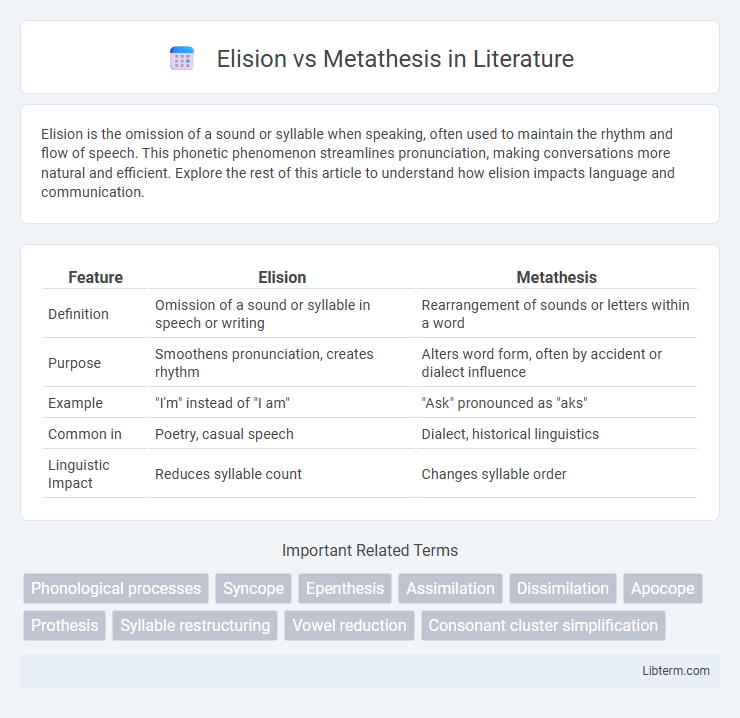Elision is the omission of a sound or syllable when speaking, often used to maintain the rhythm and flow of speech. This phonetic phenomenon streamlines pronunciation, making conversations more natural and efficient. Explore the rest of this article to understand how elision impacts language and communication.
Table of Comparison
| Feature | Elision | Metathesis |
|---|---|---|
| Definition | Omission of a sound or syllable in speech or writing | Rearrangement of sounds or letters within a word |
| Purpose | Smoothens pronunciation, creates rhythm | Alters word form, often by accident or dialect influence |
| Example | "I'm" instead of "I am" | "Ask" pronounced as "aks" |
| Common in | Poetry, casual speech | Dialect, historical linguistics |
| Linguistic Impact | Reduces syllable count | Changes syllable order |
Introduction to Elision and Metathesis
Elision involves the omission of sounds or syllables in speech to facilitate smoother and faster pronunciation, commonly observed in contractions like "don't" from "do not." Metathesis refers to the transposition of sounds or letters within a word, altering its usual phonetic sequence, as seen in examples like "ask" becoming "aks." Both processes play significant roles in the evolution of language and phonetic variation across dialects.
Defining Elision: Meaning and Examples
Elision refers to the omission of a sound or syllable in speech to facilitate smoother and faster pronunciation, often occurring in casual or rapid speech. Common examples include the contraction "I'm" from "I am" and the dropping of the "t" sound in "next day" pronounced as "nex day." This phonological process contrasts with metathesis, which involves the rearrangement of sounds within a word.
Understanding Metathesis: Definition and Illustration
Metathesis involves the transposition of sounds or letters within a word, altering its standard phonetic sequence for ease of pronunciation or dialectal variation. Examples like the shift from "ask" to "aks" highlight how metathesis rearranges consonants to create alternate forms without changing meaning. This phonological process contrasts with elision, which entails the omission of sounds, reflecting different mechanisms of linguistic evolution and spoken language dynamics.
Historical Overview of Elision and Metathesis
Elision and metathesis have distinct historical trajectories in the evolution of languages, with elision involving the omission of sounds to facilitate faster speech, observed prominently in Ancient Greek and Latin phonetics. Metathesis, the transposition of sounds or syllables within a word, is documented in Old English and Latin, reflecting phonological shifts and dialectal influences over time. Both processes illustrate the dynamic nature of linguistic change, influencing modern phonology and orthographic forms in Romance and Germanic languages.
Linguistic Mechanisms Behind Elision
Elision involves the omission of sounds or syllables in speech to facilitate smoother and faster pronunciation, commonly occurring in casual conversation and rapid speech. This phonological process primarily targets unstressed vowels or consonants, reducing articulatory effort while maintaining intelligibility. Understanding elision requires analyzing its role in phonotactic constraints and speech rhythm, distinguishing it from metathesis, which involves the transposition of sounds rather than their deletion.
Linguistic Mechanisms Behind Metathesis
Metathesis is a linguistic mechanism involving the transposition of sounds or syllables within a word, often to simplify pronunciation or enhance phonological harmony. This process contrasts with elision, where sounds are omitted to ease speech flow. Understanding metathesis reveals how language evolution and phonetic adaptation drive systematic sound change in various languages.
Key Differences Between Elision and Metathesis
Elision involves the omission of sounds or syllables within a word or phrase, enhancing fluency and ease of pronunciation, while metathesis refers to the transposition of sounds or letters within a word, altering its phonetic structure. Elision primarily aims at reducing linguistic effort by skipping sounds, whereas metathesis rearranges sound order, sometimes leading to new dialectal variations. Understanding these processes is crucial in phonetics and historical linguistics for analyzing language evolution and speech patterns.
Elision and Metathesis in Different Languages
Elision involves the omission of sounds within words or phrases to facilitate smoother pronunciation, commonly observed in French where unstressed vowels are often dropped, such as in "je t'aime" contracting "je te aime." Metathesis, by contrast, refers to the transposition of sounds or syllables within a word and occurs in various languages like Arabic, where the word "ask" can be pronounced as "aks." Understanding these phonological processes enhances the study of linguistic evolution and dialectal variation across languages.
Effects on Pronunciation and Spelling
Elision often results in the omission of sounds or syllables, leading to smoother and more rapid pronunciation but can cause variations in spelling, especially in contracted forms like "don't" from "do not." Metathesis involves the transposition of sounds within a word, altering pronunciation patterns without necessarily changing spelling, although historical shifts have occasionally led to spelling updates reflecting spoken forms. Both processes influence language evolution by impacting phonological clarity and orthographic conventions in distinct ways.
Conclusion: Implications for Linguistic Study
Elision and metathesis reveal distinct phonological processes shaping language evolution, with elision involving sound omission and metathesis entailing sound reordering. These phenomena offer critical insights into phonetic simplification and historical language change, aiding linguistic reconstruction and speech analysis. Understanding their mechanisms deepens comprehension of language variation and informs models of language acquisition and processing.
Elision Infographic

 libterm.com
libterm.com